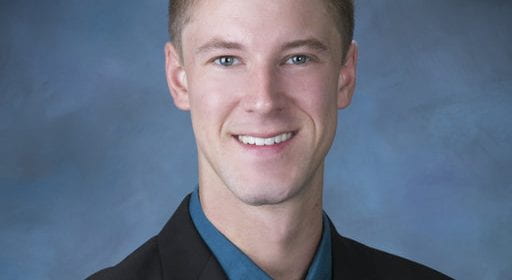Student Researcher – Colton Simmons (College of Pharmacy, PhD Candidate)


Colton Simmons is a 4th year PhD student in the College of Pharmacy at NSU. He is pursuing his PhD in Pharmaceutical Sciences through the college’s Molecular Medicine and Pharmacogenomics (MMP) track. He currently works in the AutoNation Institute for Breast Cancer Research and Care run by Dr. Jean Latimer, located on the 4th floor of the Center for Collaborative Research (CCR).
Talk me through your journey to where you are at NSU now.
I was looking at personalized medicine and genomics programs around the US when I found the pharmacogenomics track at NSU. As part of this graduate program, we spend the first two years completing coursework, both courses shared across the college as well as some just in my specific MMP track. During the first year we choose three labs to rotate in, spending four weeks in each, to experience the various types of research going on throughout the college. By the end of the first year, we choose which lab we would like to do our dissertation work in. Then, in our second year, we begin working in that lab so that by the start of year three we will have written and successfully defended an NIH-style research proposal. Once you pass the defense of this proposal, you become a PhD candidate and begin working with the PI of your lab to secure funding for your dissertation project. I am now working on my dissertation research project.
What kind of research are you working on?
The general focus of the lab is breast cancer with special emphasis on DNA repair pathway, nucleotide excision repair (NER). Our lab has found that in breast cancer as stage increases so does NER repair. In stage 1, patients have low NER repair, while in stage 4 NER repair goes up as their body tries to fight the cancer, usually without much success. I am the third PhD student working on this overarching project, and we are at the phase of working on treatment mechanisms and approaches. I am in the process now of taking the research from in vitro to in vivo in mice.
A highlight of this work was when our lab discovered a microRNA that decreases NER repair in breast cancer cell lines, thus making them sensitive to chemotherapy. This has a tremendous implication for how we treat late-stage breast cancer because if we can decrease the engine of resistance (DNA repair), we can utilize existing chemotherapy agents in a more effective way. This can decrease the amount of chemotherapy required for treatment.
What made you interested in this area of research?
In undergraduate I did a two-year “mini master’s” program to complete a general biology degree at William Jewell College in Kansas City, MO. These studies made me realize I was interested in personalized medicine. However, I didn’t want to go to medical school; I wanted to do research.
I was also interested in the genetics of disease due to family health issues with gout that impacted my father, grandfather, and some of my uncles. Traditionally doctors attribute the causes of gout to poor diet, but I became interested in the possibility of a genetic connection for the disease.
What drew me particularly to Dr. Latimer’s lab was that my mother’s best friend, with whom my family was close growing up, had breast cancer when she was young, so I have a personal connection to the disease. I’m interested in studying late-stage breast cancer where there isn’t currently a lot of hope for patients.
How does this work relate to your future career goals?
I want to work in industry, namely in a pharmaceutical company doing benchwork in their research and development unit. As I progress in my PhD program and with my research work, I will start attending conferences to do some professional networking and look for job opportunities.
What advice do you have for other students interested in getting involved in research?
Students will inevitably encounter both personal obstacles and research roadblocks. Some in research, particularly over this past year, include unfortunate consequences of the COVID-19 pandemic leading to funding scarcity and supply chain shortages. For example, we have had basic lab materials like plastic pipette tips on back order. Also, sometimes equipment breaks or a senior student member in the lab graduates, so you need to shift your work procedure to accommodate these kinds of setbacks.
My best advice is to stay the course and things will resolve. Also, have open communication with your PI around any issues you encounter, personal or research-related. For this reason it’s important when you choose your dissertation lab that you have long-term discussions with the PI regarding your academic and career goals, to ensure you have a personal connection with the PI and that your time under their research mentorship will lead you to achieving your desired outcomes.
What have been some of your favorite parts of being a graduate student at NSU?
I have been working with other students to help our PhD in pharmaceutical sciences students feel more of an association with the professional programs in the Health Professions Division (HPD). So far, we have successfully advocated for and received lab coats labeled with the College of Pharmacy logo, which has made us feel more connected with the other HPD students. We have also integrated some programming with the PharmD students, including community engagement activities like the Heart Walk. I have also enjoyed intramural sports on campus and playing sand volleyball.
In case you don’t know where to get lunch from tomorrow, Colton recommends BENTO Davie on University Dr. for some delicious fast Asian cuisine.